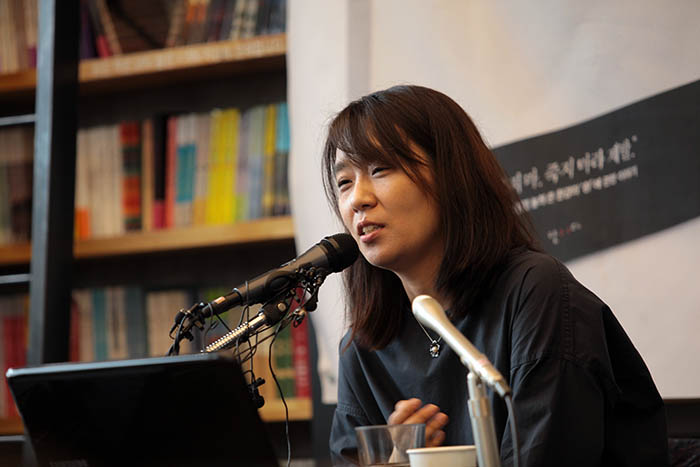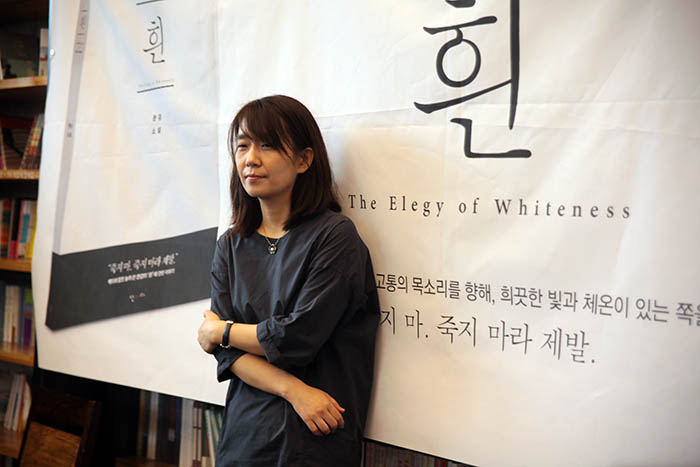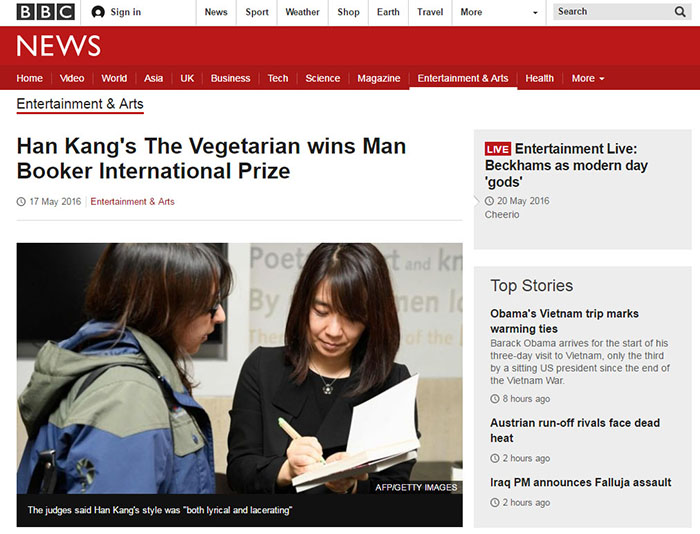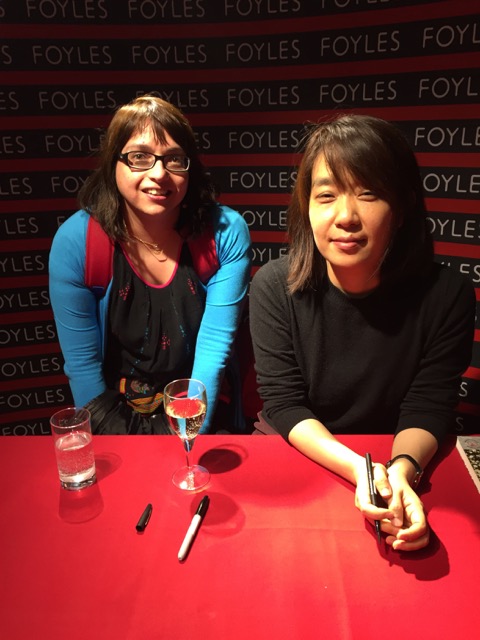-
 Korea.net's 24-hour YouTube channel
Korea.net's 24-hour YouTube channel- NEWS FOCUS
- ABOUT KOREA
- EVENTS
- RESOURCES
- GOVERNMENT
- ABOUT US

Co-winner of the Man Booker International Prize Han Kang answers questions during a press conference in Seoul on May 24.
"I believe that plenty of news and stories about Korean literature will be published now and shared around, so that winning an international literary award will no longer be such an issue."
Author Han Kang was speaking about winning the 2016 Man Booker International Prize, an award given jointly to the author and to the translator of a work of fiction translated into English, during a press conference in Seoul on May 24.
"More potential readers of Korean literature are out there, around the world, and Korean literature read by those non-Korean readers is not a far-off dream," said the Booker-winning writer. Concerning non-Korean interest in Korean literature, she said there are plenty of skillful translators and editors who are showing interest in Korean writers. In terms of Korean literature as part of world literature, "Now is the beginning," she said.
The author commented on the rising sales of "The Vegetarian," as well. "This novel might be a little bit disturbing. I want readers to read my book and see the questions that I pose."
On May 16, Han Kang's novel "The Vegetarian" was chosen as this year's winner of the Man Booker International Prize, a prestigious literary award that stands alongside the Nobel Prize in Literature and the Prix Goncourt. The award-winning novel is the story of a young woman, Yeong-hye, who is plagued by violent, bloody dreams, decides as a result to give up meat and believes that she's turning into a tree. The novel was published in Korean in Korea in 2007, but was published in English in the U.K. only in January 2015.
Han's press conference in Seoul also promoted her new book "The Elegy of Whiteness." This new book is about people who have to make moral decisions in certain social contexts, the author explained. "The Elegy of Whiteness" will be translated by "The Vegetarian" translator Deborah Smith and will be published in English in the U.K. later next year.

Han Kang's new book 'The Elegy of Whiteness' is unveiled during a press conference in Seoul on May 24.
As the award was announced, media from around the world covered the story. In the BBC article "The Vegetarian: How to learn Korean and win awards" that was published on May 17, the story focused on the translator, Deborah Smith, the Korean language and the Korean alphabet, Hangeul. Expressing surprise at Deborah Smith who helped win the literary award as translator after studying Korean for only seven years, the BBC concluded that, "The translator deserved the prize. So would King Sejong." CNN quoted judging panel chairman Boyd Tonkin as saying that, "This compact, exquisite and disturbing book will linger long in the minds, and maybe the dreams, of its readers." The news outlet said that the contributions made by translator Deborah Smith, who was monolingual until the age of 21, were also quite significant.

CNN reports on the most recent winners of the Man Booker International Prize on May 16.
Worldwide, readers of Korean literature have also been excited with the win, hoping that they might be able to enjoy a wider variety of Korean literature in their vernacular in the near future.
Korea.net Honorary Reporter Diya Mitra is one such reader. She's a huge Korean literature fan, and is an active member of a Korean literature book club at the Korean Cultural Center in London. Her passion for Korean literature seems to have been rewarded when the BBC used a picture of her in her Korea.net Honorary Reporter jacket standing next to author Han Kang in its article.

In a BBC article about Han Kang's win, there's a picture of author Han Kang and Korea.net Honorary Reporter Diya Mitra. The picture was taken during a reading by Man Booker International Prize nominees in London on May 15.
"I was so happy to hear about her win. Smith and Han both thoroughly deserve it," said Mitra. As an avid reader of Korean literature, she said she likes Han because, "Han's writing is brutally honest and her descriptions very vivid," and as much as she loved "The Vegetarian," she said she loved "Human Acts" more. With her bookshelves filled with Korean literature, Mitra said, "Hopefully, the Man Booker International Prize will give Korean Literature the focus it deserves worldwide and increasethe appetite for Korean literature translated into English."
By Chang Iou-chung
Korea.net Staff Writer
Photos: Nanda, Diya Mitra
icchang@korea.kr

Korea.net Honorary Reporter Diya Mitra (left) and Booker-winning author Han Kang pose for a picture in January in London. The picture was taken by Kim Jong Ja.
Most popular
- China warmly welcomes first Korea-born giant panda Fu Bao
- First hearing-impaired K-pop act hopes for 'barrier-free world'
- Novelist Hwang's 'Mater 2-10' shortlisted for Int'l Booker Prize
- Expats could account for 7% of population in 20 years: report
- Nat'l Fire Agency picks 137 elite staff for deployment abroad













